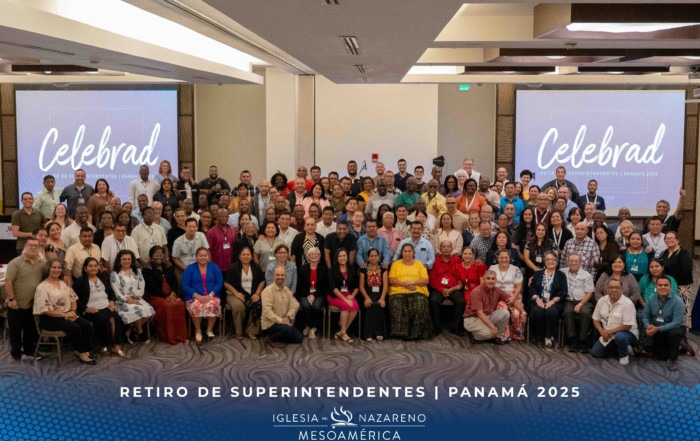ARTICLES OF FAITH
In order that we may preserve our God-given heritage, the faith once delivered to the saints, especially the doctrine and experience of entire sanctification as a second work of grace, and also that we may cooperate effectually with other branches of the Church of Jesus Christ in advancing God’s kingdom, we, the ministers and lay members of the Church of the Nazarene, in accordance with the principles of constitutional legislation established among us, do hereby ordain, adopt, and set forth as the fundamental law or Constitution of the Church of the Nazarene the Articles of Faith, the Covenant of Christian Character, and the Articles of Organization and Government here following, to wit:
(1) Scripture references are supportive of the Articles of Faith and were placed here by action of the 1976 General Assembly but are not to be considered part of the Constitutional text.
(2) Constitutional changes adopted by the 2013 General Assembly are in the process of ratification by the district assemblies at the time of printing. Where changes are being made, words in italics are new words and words in brackets [] are words being deleted.
(Genesis 1; Leviticus 19:2; Deuteronomy 6:4-5; Isaiah 5:16; 6:1-7; 40:18-31; Matthew 3:16-17; 28:19-20; John 14:6-27; 1 Corinthians 8:6; 2 Corinthians 13:14; Galatians 4:4-6; Ephesians 2:13-18; 1 John 1:5; 4:8)
We believe that Jesus Christ died for our sins, and that He truly arose from the dead and took again His body, together with all things appertaining to the perfection of man’s nature, wherewith He ascended into heaven and is there engaged in intercession for us.
(Matthew 1:20-25; 16:15-16; Luke 1:26-35; John 1:1-18; Acts 2:22-36; Romans 8:3, 32-34; Galatians 4:4-5; Philippians 2:5-11; Colossians 1:12-22; 1 Timothy 6:14-16; Hebrews 1:1-5; 7:22-28; 9:24-28; 1 John 1:1-3; 4:2-3, 15)
(John 7:39; 14:15-18, 26; 16:7-15; Acts 2:33; 15:8-9; Romans 8:1-27; Galatians 3:1-14; 4:6; Ephesians 3:14-21; 1 Thessalonians 4:7-8; 2 Thessalonians 2:13; 1 Peter 1:2; 1 John 3:24; 4:13)
(Luke 24:44-47; John 10:35; 1 Corinthians 15:3-4; 2 Timothy 3:15-17; 1 Peter 1:10-12; 2 Peter 1:20-21)
5.1. We believe that original sin, or depravity, is that corruption of the nature of all the offspring of Adam by reason of which everyone is very far gone from original righteousness or the pure state of our first parents at the time of their creation, is averse to God, is without spiritual life, and inclined to evil, and that continually. We further believe that original sin continues to exist with the new life of the regenerate, until the heart is fully cleansed by the baptism with the Holy Spirit.
5.2. We believe that original sin differs from actual sin in that it constitutes an inherited propensity to actual sin for which no one is accountable until its divinely provided remedy is neglected or rejected.
5.3. We believe that actual or personal sin is a voluntary violation of a known law of God by a morally responsible person. It is therefore not to be confused with involuntary and inescapable shortcomings, infirmities, faults, mistakes, failures, or other deviations from a standard of perfect conduct that are the residual effects of the Fall. However, such innocent effects do not include attitudes or responses contrary to the spirit of Christ, which may properly be called sins of the spirit. We believe that personal sin is primarily and essentially a violation of the law of love; and that in relation to Christ sin may be defined as unbelief.
(Original sin: Genesis 3; 6:5; Job 15:14; Psalm 51:5; Jeremiah 17:9-10; Mark 7:21-23; Romans 1:18-25; 5:12-14; 7:1-8:9; 1 Corinthians 3:1-4; Galatians 5:16-25; 1 John 1:7-8
Personal sin: Matthew 22:36-40 ; John 8:34-36; 16:8-9; Romans 3:23; 6:15-23; 8:18-24; 14:23; 1 John 1:9-2:4; 3:7-10)
(Isaiah 53:5-6, 11; Mark 10:45; Luke 24:46-48; John 1:29; 3:14-17; Acts 4:10-12; Romans 3:21-26; 4:17-25; 5:6-21; 1 Corinthians 6:20; 2 Corinthians 5:14-21; Galatians 1:3-4; 3:13-14; Colossians 1:19-23; 1 Timothy 2:3-6; Titus 2:11-14; Hebrews 2:9; 9:11-14; 13:12; 1 Peter 1:18-21; 2:19-25; 1 John 2:1-2)
We believe that all persons, though in the possession of the experience of regeneration and entire sanctification, may fall from grace and apostatize and, unless they repent of their sins, be hopelessly and eternally lost.
(Godlikeness and moral responsibility: Genesis 1:26-27; 2:16-17; Deuteronomy 28:1-2; 30:19; Joshua 24:15; Psalm 8:3-5; Isaiah 1:8-10; Jeremiah 31:29-30; Ezekiel 18:1-4; Micah 6:8; Romans 1:19-20; 2:1-16; 14:7-12; Galatians 6:7-8
Natural inability: Job 14:4; 15:14; Psalms 14:1-4; 51:5; John 3:6a; Romans 3:10-12; 5:12-14, 20a; 7:14-25
Free grace and works of faith: Ezekiel 18:25-26; John 1:12-13; 3:6b; Acts 5:31; Romans 5:6-8, 18; 6:15-16, 23; 10:6-8; 11:22; 1 Corinthians 2:9-14; 10:1-12; 2 Corinthians 5:18-19; Galatians 5:6; Ephesians 2:8-10; Philippians 2:12-13; Colossians 1:21-23; 2 Timothy 4:10a; Titus 2:11-14; Hebrews 2:1-3; 3:12-15; 6:4-6; 10:26-31; James 2:18-22; 2 Peter 1:10-11; 2:20-22)
(2 Chronicles 7:14; Psalms 32:5-6; 51:1-17; Isaiah 55:6-7; Jeremiah 3:12-14; Ezekiel 18:30-32; 33:14-16; Mark 1:14-15; Luke 3:1-14; 13:1-5; 18:9-14; Acts 2:38; 3:19; 5:31; 17:30-31; 26:16-18; Romans 2:4; 2 Corinthians 7:8-11; 1 Thessalonians 1:9; 2 Peter 3:9)
9.1. We believe that regeneration, or the new birth, is that gracious work of God whereby the moral nature of the repentant believer is spiritually quickened and given a distinctively spiritual life, capable of faith, love, and obedience.
9.2. We believe that adoption is that gracious act of God by which the justified and regenerated believer is constituted a son of God.
9.3. We believe that justification, regeneration, and adoption are simultaneous in the experience of seekers after God and are obtained upon the condition of faith, preceded by repentance; and that to this work and state of grace the Holy Spirit bears witness.
(Luke 18:14; John 1:12-13; 3:3-8; 5:24; Acts 13:39; Romans 1:17; 3:21-26, 28; 4:5-9, 17-25; 5:1, 16-19; 6:4; 7:6; 8:1, 15-17; 1 Corinthians 1:30; 6:11; 2 Corinthians 5:17-21; Galatians 2:16-21; 3:1-14, 26; 4:4-7; Ephesians 1:6-7; 2:1, 4-5; Philippians 3:3-9; Colossians 2:13; Titus 3:4-7; 1 Peter 1:23; 1 John 1:9; 3:1-2, 9; 4:7; 5:1, 9-13, 18)
We believe that entire sanctification is that act of God, subsequent to regeneration, by which believers are made free from original sin, or depravity, and brought into a state of entire devotement to God, and the holy obedience of love made perfect.
It is wrought by the baptism with or infilling of the Holy Spirit, and comprehends in one experience the cleansing of the heart from sin and the abiding, indwelling presence of the Holy Spirit, empowering the believer for life and service. Entire sanctification is provided by the blood of Jesus, is wrought instantaneously by grace through faith, preceded by entire consecration; and to this work and state of grace the Holy Spirit bears witness.
This experience is also known by various terms representing its different phases, such as “Christian perfection,” “perfect love,” “heart purity,” “the baptism with or infilling of the Holy Spirit,” “the fullness of the blessing,” and “Christian holiness.”
10.1. We believe that there is a marked distinction between a pure heart and a mature character. The former is obtained in an instant, the result of entire sanctification; the latter is the result of growth in grace.
We believe that the grace of entire sanctification includes the divine impulse to grow in grace as a Christlike disciple. However, this impulse must be consciously nurtured, and careful attention given to the requisites and processes of spiritual development and improvement in Christlikeness of character and personality. Without such purposeful endeavor, one’s witness may be impaired and the grace itself frustrated and ultimately lost.
Participating in the means of grace, especially the fellowship, disciplines, and sacraments of the Church, believers grow in grace and in wholehearted love to God and neighbor.
(Jeremiah 31:31-34; Ezekiel 36:25-27; Malachi 3:2-3; Matthew 3:11-12; Luke 3:16-17; John 7:37-39; 14:15-23; 17:6-20; Acts 1:5; 2:1-4; 15:8-9; Romans 6:11-13, 19; 8:1-4, 8-14; 12:1-2; 2 Corinthians 6:14-7:1; Galatians 2:20; 5:16-25; Ephesians 3:14-21; 5:17-18, 25-27; Philippians 3:10-15; Colossians 3:1-17; 1 Thessalonians 5:23-24; Hebrews 4:9-11; 10:10-17; 12:1-2; 13:12; 1 John 1:7, 9)
(“Christian perfection,” “perfect love”: Deuteronomy 30:6; Matthew 5:43-48; 22:37-40; Romans 12:9-21; 13:8-10; 1 Corinthians 13; Philippians 3:10-15; Hebrews 6:1; 1 John 4:17-18
“Heart purity”: Matthew 5:8; Acts 15:8-9; 1 Peter 1:22; 1 John 3:3
“Baptism with the Holy Spirit”: Jeremiah 31:31-34; Ezekiel 36:25-27; Malachi 3:2-3; Matthew 3:11-12; Luke 3:16-17; Acts 1:5; 2:1-4; 15:8-9
“Fullness of the blessing”: Romans 15:29 “Christian holiness”: Matthew 5:1-7:29; John 15:1-11; Romans 12:1-15:3; 2 Corinthians 7:1; Ephesians 4:17-5:20; Philippians 1:9-11; 3:12-15; Colossians 2:20-3:17; 1 Thessalonians 3:13; 4:7-8; 5:23; 2 Timothy 2:19-22; Hebrews 10:19-25; 12:14; 13:20-21; 1 Peter 1:15-16; 2 Peter 1:1-11; 3:18; Jude 20-21)
God calls the Church to express its life in the unity and fellowship of the Spirit; in worship through the preaching of the Word, observance of the sacraments, and ministry in His name; by obedience to Christ, holy living, and mutual accountability.
The mission of the Church in the world is to share in the redemptive and reconciling ministry of Christ in the power of the Spirit. The Church fulfills its mission by making disciples through evangelism, education, showing compassion, working for justice, and bearing witness to the kingdom of God.
The Church is a historical reality that organizes itself in culturally conditioned forms, exists both as local congregations and as a universal body, and also sets apart persons called of God for specific ministries. God calls the Church to live under His rule in anticipation of the consummation at the coming of our Lord Jesus Christ.
(Exodus 19:3; Jeremiah 31:33; Matthew 8:11; 10:7; 16:13-19, 24; 18:15-20; 28:19-20; John 17:14-26; 20:21-23; Acts 1:7-8; 2:32-47; 6:1-2; 13:1; 14:23; Romans 2:28-29; 4:16; 10:9-15; 11:13-32; 12:1-8; 15:1-3; 1 Corinthians 3:5-9; 7:17; 11:1, 17-33; 12:3, 12-31; 14:26-40; 2 Corinthians 5:11-6:1; Galatians 5:6, 13-14; 6:1-5, 15; Ephesians 4:1-17; 5:25-27; Philippians 2:1-16; 1 Thessalonians 4:1-12; 1 Timothy 4:13; Hebrews 10:19-25; 1 Peter 1:1-2, 13; 2:4-12, 21; 4:1-2, 10-11; 1 John 4:17; Jude 24; Revelation 5:9-10)
Baptism being a symbol of the new covenant, young children may be baptized, upon request of parents or guardians who shall give assurance for them of necessary Christian training.
Baptism may be administered by sprinkling, pouring, or immersion, according to the choice of the applicant.
(Matthew 3:1-7; 28:16-20; Acts 2:37-41; 8:35-39; 10:44-48; 16:29-34; 19:1-6; Romans 6:3-4; Galatians 3:26-28; Colossians 2:12; 1 Peter 3:18-22)
(Exodus 12:1-14; Matthew 26:26-29; Mark 14:22-25; Luke 22:17-20; John 6:28-58; 1 Corinthians 10:14-21; 11:23-32)
(2 Kings 5:1-19; Psalm 103:1-5; Matthew 4:23-24; 9:18-35; John 4:46-54; Acts 5:12-16; 9:32-42; 14:8-15; 1 Corinthians 12:4-11; 2 Corinthians 12:7-10; James 5:13-16)
(Matthew 25:31-46; John 14:1-3; Acts 1:9-11; Philippians 3:20-21; 1 Thessalonians 4:13-18; Titus 2:11-14; Hebrews 9:26-28; 2 Peter 3:3-15; Revelation 1:7-8; 22:7-20)
16.1. We believe in future judgment in which every person shall appear before God to be judged according to his or her deeds in this life.
16.2. We believe that glorious and everlasting life is assured to all who savingly believe in, and obediently follow, Jesus Christ our Lord; and that the finally impenitent shall suffer eternally in hell.
(Genesis 18:25; 1 Samuel 2:10; Psalm 50:6; Isaiah 26:19; Daniel 12:2-3; Matthew 25:31-46; Mark 9:43-48; Luke 16:19-31; 20:27-38; John 3:16-18; 5:25-29; 11:21-27; Acts 17:30-31; Romans 2:1-16; 14:7-12; 1 Corinthians 15:12-58; 2 Corinthians 5:10; 2 Thessalonians 1:5-10; Revelation 20:11-15; 22:1-15)
Hurricane Melissa brings devastation to Jamaica, greater Caribbean
Hurricane Melissa made landfall in Jamaica on 28 October 2025 as a catastrophic Category 5 storm. Melissa was the strongest storm in recorded history to
Superintendents’ Retreat “Celebrad” strengthens district leadership in Mesoamerica
United in His presence, God renews vision, character, and mission. Panama City hosted the Mesoamerica Region’s Superintendents’ Retreat, “Celebrad,” (Celebrate) held October 20–23, 2025, at the


